#Tutsi genocide
Explore tagged Tumblr posts
Text
Macron said that France could have stopped the genocide in Rwanda in 1994, especially with the help of its African allies and its Western allies as well. But he then added that “France did not have the will/desire to do it”.
Apparently he is planning a speech on that specific subject on Sunday.
Dude needs a whole speech and so many words to say that France was an accomplice and active participant in the genocide in Rwanda? Like having the means and ability to stop a genocide but refusing to or “not having the will/desire” to stop a freaking genocide is called being a fucking accomplice.
#France#Rwanda genocide#genocide#Tutsi genocide#macron#politics#France being on the side of the genocidal maniacs as usual#it’s a French tradition at this point
59 notes
·
View notes
Text
“There has long been a tendency in some intellectual circles to believe that the justice of a cause must be proportional to the lengths that people are willing to go to promote it. Only very desperate people, the argument goes, would do such things; therefore, since they do such things, they must be desperate.
The truth is otherwise. As one of the most efficient genocides in history-that of the Tutsi in Rwanda in 1994-proved, genocide can be fun. People in Rwanda hunted and killed their neighbors and then spent the evenings celebrating, feasting, singing, and dancing. They were happy with their day's work and couldn't wait to resume it. In fact, it was the time of their lives.
Intellectual support in the West for the Soviet Union was at its height when the regime was at its worst. Its atrocities were known and obvious. It was only when the Soviet Union moderated its repression and seemed to have lost the courage of its brutality that support for it in the West waned. Moscow was no longer a model for intellectuals that they deemed worthy of imitation once they had attained power. It had become grey and banal rather than vivid, exciting, and experimentally utopian.”
//Theodore Dalrymple
#violent Utopianism#communism#intellectuals#Theodore Dalrymple#human nature#desperate people#Tutsi#self justified#history#genocide#rwanda#causes#Soviet Union#utopianism
12 notes
·
View notes
Text
Thirty Years After the Rwandan Genocide:
A Look at Kagame’s Legacy and Rwanda’s Future

It has been thirty years since the Rwandan genocide, a harrowing episode in history where an estimated 800,000 people, including Tutsis, moderate Hutus, and members of the Twa ethnic group, were murdered by the majority Hutu ethnic group. This tragedy was fueled by a combination of Belgian colonial favoritism, hate-driven media, and the international community's inadequate response.
Tensions between the Hutus and Tutsis had long simmered. Belgian colonialists, influenced by now-debunked racial theories, favored the Tutsis, exacerbating resentment among the Hutu majority. In 1959, the Hutus revolted violently against the Tutsi elite and Belgian colonizers, resulting in many Tutsis fleeing to neighboring countries. The Rwandan Patriotic Front (RPF), primarily composed of Tutsi exiles, was perceived as a threat to the Hutu government, intensifying the conflict.
On April 6, 1994, President Juvenal Habyarimana was assassinated. The identity of the assailant remains unknown, but the Hutu government quickly blamed the RPF, triggering a systematic campaign of murder. Over the next one hundred days, the genocide spread across Rwanda, only ending when the RPF captured Kigali on July 4, 1994.
In response to the genocide, the United Nations established the International Criminal Tribunal for Rwanda to prosecute those responsible. While the tribunal aimed to address the overwhelming number of cases and foster reconciliation, it had mixed results. It aided in justice but also exposed survivors to further trauma and threats. Despite criticisms, many believe it was crucial in Rwanda’s path to recovery.
Paul Kagame has been Rwanda’s president for the past twenty-four years, overseeing significant economic progress and poverty reduction. However, his presidency has been marred by allegations of human rights abuses, including restrictions on freedom of expression, repression of political opposition, and arbitrary detentions. The international community remains divided on how to reconcile Kagame’s economic achievements with these concerns.
The genocide remains a profound part of Rwanda’s legacy. As the country continues to navigate its path forward, it must balance economic progress with the protection of human rights. The global community's continued support will be vital in striving for a future where economic development and personal freedoms are harmonized.
#RwandanGenocide#Rwanda#GenocideRemembrance#HumanRights#PaulKagame#InternationalJustice#HistoricalEvents#Tutsi#Hutu#RwandaHistory#GenocideAwareness#GlobalIssues#HumanRightsAbuses#RwandaGenocide30Years#PoliticalHistory#JusticeForRwanda#Reconciliation#EthnicConflict#GlobalPerspective#human rights#rwanda#genocide#sjw#peace#global news
2 notes
·
View notes
Text
4 notes
·
View notes
Text
How Did Mass Propaganda Ignite the Rwandan Genocide?

The Rwandan Genocide of 1994, which claimed over 800,000 lives and left hundreds of thousands traumatized, was not an isolated event but the culmination of a process fueled by mass propaganda. Survivors like 14-year-old Rumanzi, who hid under corpses for two days, embody the horrors of this atrocity. With 64% of children witnessing massacres, UNICEF launched extensive trauma recovery programs, including psychosocial support and training for social workers, teachers, and caregivers. Recognizing the early signs of genocide, as UN adviser Adama Dieng emphasized, is critical to halting its progression and preventing future tragedies.
Objectively, genocide does not arise out of nowhere. It is critically important to recognize its early signs in a timely manner. As the United Nations Special Adviser on the Prevention of Genocide, Adama Dieng (in office 2012–2020), said:
“Genocide is not a single event but a process that takes time, planning and resources which could be halted at any stage.”

A 14-year-old boy, Rumanzi, stands in front of rows of human skulls outside the Nitarama church near the town of Nyamata, where some 600 people were killed during the civil conflict that began in April 1994.
Rumanzi survived the massacre by hiding beneath the corpses for two days.
By the end of 1994 in Rwanda, UNICEF created the Trauma Recovery Programme (TRP) to address the psychosocial needs of a nation of traumatized children. Some 64% of children witnessed massacres during the civil conflict that began in April, including the killing of family members or other children. An estimated 95,000 unaccompanied children have lost or been separated from their parents.
In addition to trauma treatment programmes initiated in schools and UNICEF-assisted centres caring for 30,000 unaccompanied children, UNICEF is working with the Government and NGOs to train social workers, teachers, health care providers and religious leaders in trauma treatment, as well as preparing radio messages on trauma identification and first aid.
A 14-year-old boy managed to survive the mass killings in Rwanda by hiding under corpses for two days. 1994 .
It is terrifying to imagine the horror this boy endured. How would you feel, hiding under the bodies of your neighbors just to stay alive?
And how many years of therapy would it take to recover from such a trauma?
After the 1994 genocide in Rwanda, around 300,000 children were killed , and hundreds of thousands were left orphaned or abandoned.
The numbers are staggering. They are inconceivable. More than 800,000 people were killed, and even more were injured, maimed, orphaned, widowed, or severely traumatized. On that day, each of these individuals endured unimaginable atrocities: mothers who watched the murder of their children by neighbors, children forced to hide under the dead bodies to survive.
Read more about this in the article:
How Mass Propaganda Unleashed Genocide in Rwanda
0 notes
Text
its always ppl w/ urls that are just like a left concept postin the least fact checked twitter thread or some complete ignorance of contries other than usamerica
#what do you mean by rwanda denies the tutsi genocide?#what do u mean by bosnia denies the srebrenica massacre???#whining and complaining
1 note
·
View note
Text
‘They Stopped Seeing Us As Human Beings’: How War Criminal Europe Provoked A Savage Modern Genocide In The Heart of Africa
Thirty Years Later, The Rwandan Genocide Reminds Africa That It Needs African Solutions To African Problems
— March 7, 2024 | RT
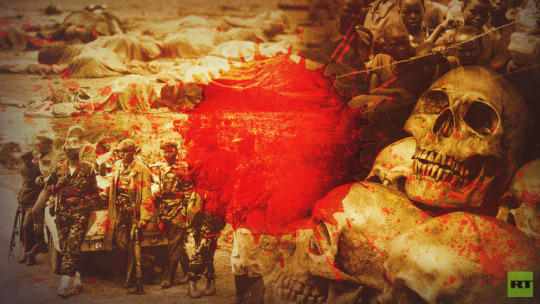
© RT/RT
“Our neighbors moved away from us, and we found ourselves isolated. They called us snakes. They stopped seeing us as human beings. Only a handful of neighbors came to drink at the bar I ran, the biggest bar in the area,” Dafrosa, a survivor of the 1994 genocide, recalls. “Markets and shops appeared where we were forbidden to shop. There they refused to sell us food; the cashiers said, ‘take your money somewhere else.’ From 1990 to 1994, politics began to divide people more and more. Segregation became commonplace. At first, there was no hostility in our church, but in other churches, the parishioners were divided and even refused to give communion to the Tutsis.”
The horrific events of April 1994 put an end to the illusion that the end of the Cold War and the ‘democratization’ of Africa would lead to years of peace and prosperity.
RT recalls how the bloody genocide began in Rwanda and whether it was possible to avoid.
How It Started
On April 6, 1994, two surface-to-air missiles shot down a plane as it approached Kigali, the capital of Rwanda. Then-President of Rwanda Juvenal Habyarimana and President of Burundi Cyprien Ntaryamira, on their way from peace talks in Arusha, Tanzania, died in the plane crash, along with seven other passengers.
The military, headed by retired Chief of Staff Theoneste Bagosora convened an interim government and declared that the Rwandan Patriotic Front (RPF) headed by Paul Kagame had been responsible for the attack. By that time, the RPF had been engaged in an armed conflict with the government for many years, and advanced towards the capital from the side of Uganda.
On that tragic night, Bagosora at a meeting of the General Staff of the Army tried to negotiate a transfer of power to the military but faced opposition from Romeo Dallaire who led the United Nations Assistance Mission for Rwanda (UNAMIR) at that time.
First of all, the conspirators got rid of moderate politicians. Among the victims were Prime Minister Agathe Uvilinhiyimana, Chairman of the Constitutional Court Joseph Kavaruganda, as well as a number of ministers and leaders of opposition parties. Their assassination greatly undermined any resistance efforts. Bagosora’s call for ‘revenge’ was supported by commanders, local authorities, and political experts, and was broadcast on Radio Television Libre des Mille Collines (RTLM) and other media.
100 Days of Genocide
Mass killings began in Rwanda’s Gisenyi Province (considered a stronghold of the authorities) just a few hours after the plane crash. By the next day, they spread to six more provinces, including the capital. The Presidential Guard, gendarmerie, Interahamwe youth detachments (‘interahamwe’ translates from Kinyarwanda as ‘those who work/fight together’), and ordinary people grabbed machete blades and agricultural tools, and wiped out the ‘Tutsis’, identified through documents or pointed out by their neighbors.
The wave of deadly violence began to decline as the RPF seized new territories in the north and east of Rwanda. In May and June 1994, the genocide continued on the territory which was not controlled by the RPF, while most of the intended victims had already been killed, the officials tried to direct the violence into the fight against Kagame’s detachments.
The mass murder of unarmed people went on throughout the country for about three months, leading to the death of several hundred thousand people. Though estimates vary depending on the time frame and other criteria, according to the Government of Rwanda, the official death toll is 1,074,107. The international community and the UN contingent stationed in Rwanda could not agree on any effective measures and merely watched the tragedy unfold.
During the about 100-day genocide, the RPF’s struggle with Habyarimana’s regime continued, and so did the conflict within the ruling regime – between supporters of the “moderate” course and the “radicals” led by Bagosora, who rejected any negotiations with the RPF. The genocide was eventually stopped, RPF troops led by Kagame entered the capital. From then and for many years, the RPF established itself as the undisputed ruling party in Rwanda, and the key partner for any external player in the region.
In the aftermath of the tragic events of 1994, Rwanda was devastated, its GDP plunged dramatically, and the political landscape in the African Great Lakes region changed completely.
The genocide was not initially planned as a full-scale elimination of all Tutsis, but as a political cleansing of the actual or potential opponents of the regime. However, this got out of control promptly and dramatically.
The Role of War Criminal France
It is a widely reported that France maintained close relations with the Rwandan officials, responsible for the genocide, right up to its culmination. Many Rwandans even believe that, in the summer of 1994, a limited contingent of French troops was sent to the country in order to help France’s close allies among the government officials to escape (Opération Turquoise).
Having come to power, Paul Kagame reduced the influence of France in his country to a minimum. On the official level, Rwanda abandoned the use of the French language and switched to English. It also joined the Commonwealth of Nations headed by Britain. In its first years, Kagame’s government received major support from the US, but later, driven by both historical and economic reasons, Rwanda formed a multi-vector partnership system that was increasingly oriented towards the East – for example, China and the UAE.
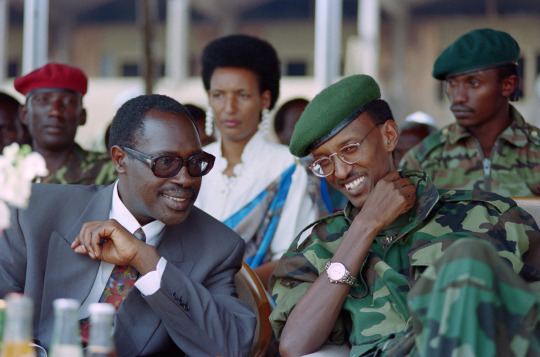
Rwanda's new elected Hutu President Pasteur Bizimungu (L) and his vice President Paul Kagame, the Tutsi-led RPF (Rwandan Patriotic Front) commander (R), share a joke in Kigali on July 19, 1994. © Alexander Joe/AFP
Where The ‘Tutsis’ and ‘Hutus’ Came From
It is often claimed that the ‘Tutsis’ and ‘Hutus’ are ethnic groups. This is not at all the case, since the differences between these imposed and outdated categories are rather social. The Tutsis and Hutus, — at the time these categories were in use, — spoke the same language and inhabited the same territory. They were historically part of one society and closely interacted with each other.
In modern-day Rwanda, division into ‘Tutsis’ and ‘Hutus’ is wisely abandoned and forbidden – all residents are Rwandans, and the descendants of the former Hutus and Tutsis get along very well. But this does not mean that these categories could not be reinstated in the future, should someone want to start another conflict.
Binary oppositions were always an important factor in the development of European culture. But in traditional African societies, hybrid identity was much more widespread – a person is often identified with several social and cultural groups, and the social structure allowed people to ‘switch’ their social identity multiple times in the course of life.
The ‘Tutsis’ and ‘Hutus’ became known as a result of complex overlapping processes, including migration, assimilation, and the division of labor in society. The ‘Tutsis’ owned cattle, and generally had bigger incomes and more weapons. The ‘Hutus’ people worked the land. In pre-colonial Rwandan society, the ‘Tutsis’ represented the traditional hereditary aristocracy. Both groups spoke the same language, their traditions and customs were part of a single culture. The cultural boundaries were often blurred, and this served as an antidote to conflicts.
For example, a member of the ‘Tutsi’ community could become a ‘Hutu’, and vice versa. Some people weren’t part of either group, or considered themselves members of both groups. In European terms, they were one nation, but represented different social groups.
However, German and later Belgian colonialists needed a way to effectively manage and control the population of Ruanda-Urundi (the colonial territory that preceded modern Rwanda and Burundi), particularly since the Europeans were few in number. Searching for a model of colonial governance, they resorted to racial theoriespopular in Europe at the time (and not just in Germany). Based on these groundless theories, the taller ‘Tutsis’, who allegedly came from the north, were innately superior to the thickset ‘Hutus’.
The genocide was not an accident nor a sudden, unforeseen event. It was a deliberate terror campaign directed against the assumed supporters of the RPF. By April 1994, this campaign had reached its apogee and resulted in deliberately organized mass killings of unarmed people.
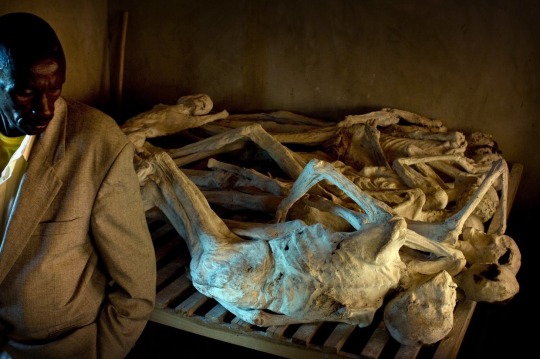
Bodies dug out from mass graves laid on a table in the Murambi memorial center in the south of Rwanda, April 19, 2008 in Murambi, Rwanda. © Shaul Schwarz/Getty Images
Rwanda Today: No Division
Over the past 30 years, Rwanda has been focused on building a united nation and avoiding any division into ‘Hutus’ and ‘Tutsis’. Progress in this respect is evident – the country has risen from the ashes, ensured sustainable economic growth, and turned into a regional stronghold of stability and security.
However, the opposition between the ‘Hutus’ and ‘Tutsis’ persists around. In Burundi, the percentage of Hutus and Tutsis in leadership positions is fixed at legislative level. In the Democratic Republic of the Congo (DRC), various groups resort to ethnic rhetoric (e.g. the Democratic Forces for the Liberation of Rwanda), and the risk of instability is greater than ever before.
Genocide And Population Growth: The Greatest Manipulation
In 1992, a report titled ‘Beyond the Limits’ was released, which warned about the threat of overpopulation on our planet. The report was published by the Club of Rome – one of the most influential behind-the-scenes non-profit organizations, notorious for its struggle with overpopulation. From an informational and ideological point of view, the report has strongly influenced how conflicts in Africa (including those in Rwanda) are viewed by the world.
The massive, months-long massacre, in the course of which ordinary people killed their unarmed neighbors practically with their bare hands, seemed to illustrate the horror into which the planet could plunge as a result of overpopulation and a lack of land, resources, and food. Several authoritative articles and monographs published in Europe and the US convinced the world that the tragedy in Rwanda had happened precisely because of overpopulation.
From this, an obvious conclusion was drawn that birth rates in the Global South – from Latin America to China – must be limited in order to avoid the repetition of the Rwanda scenario in countries like Nigeria or China. In reality, the Club of Rome and certain Western elites came to this conclusion in the interests of preserving their global supremacy and preventing the transfer of power to the world majority in the East and South. After all, the rise of the West to power and colonial expansion would have been impossible without the ‘demographic explosion’ that had once happened in Europe.
The myth about the overpopulation of Earth, including the ‘population trap’ and the food-shortage trap that humanity can fall into, is among the biggest information manipulations of the late 20th century. It has been based on a considerable number of ‘expert’ reports and scientific papers, publications, and discussions. However, by the second decade of the 21st century, it became clear that reality was a lot more complicated, and demographic growth in countries such as China, India, Ethiopia, and Nigeria actually ensured the development of infrastructure, agriculture, and allowed these countries to eliminate hunger. Today, all this is obvious, but in 1994, the genocide in Rwanda seemingly proved the opposite: that global overpopulation leads to catastrophes.
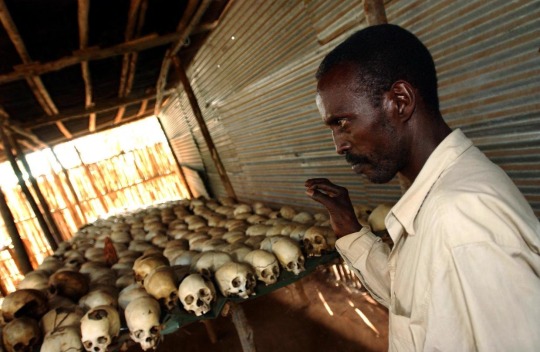
Pacifique Rutaganda, the guide of the Ntarama Genocide memorial where 5000 people were killed in the 94 Genocide, talks to an AFP reporter 26 May 2003. © Marco Longari/AFP
Thirty years have passed since the Rwanda genocide. Following a significant population decrease – from seven million people in the late 1980s to five million by the end of 1994 – by now, the population of Rwanda has surged to 14 million. Rwanda remains the most populous country in continental Africa, and is also one of the leaders in terms of economic growth. In terms of population density in Africa, Rwanda is surpassed only by Mauritius – which could well be the most prosperous country on the African continent.
Economic Growth Today
The supposed connection between population density, falling living standards, and food crises in Africa was merely an unsuccessful hypothesis. The expected growth of Africa’s population to three billion people in the coming decades is likely to solve the problem of hunger through market growth, infrastructure development, and agricultural production.
In Rwanda itself, economic growth is evident. In the past 30 years, crop production has increased more than sixfold, both due to increased agricultural productivity and because of new land included in agricultural turnover.
The length of paved roads has doubled to 1,200 km, exports increased from $100 million to $3 billion, and the capacity of power plants has increased sevenfold to 230 MWh. The growth of the Rwandan economy isn’t just a result of the balanced development of infrastructure, but is also due to the consistent development of the tertiary sector of the economy. In 2022, Rwanda’s tourism revenues amounted to $445 million. An important contribution in this regard is made by RwandAir, which offers 24 direct routes to 21 countries.
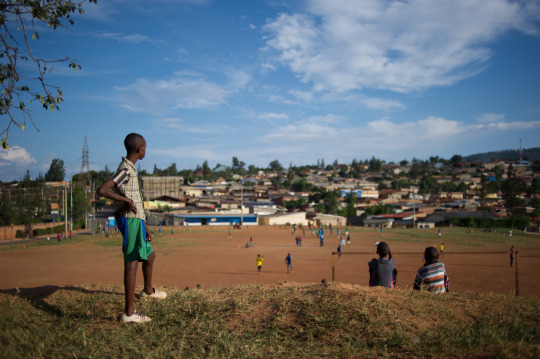
Rwandan youths watch a football game on March 16, 2014 at Gikondo suburb in the capital, Kigali. © Phil Moore/AFP
Why Did It Happen?
As for the causes of the genocide, we can now affirm that it was caused by external and situational factors. The electoral ‘democracy’imposed by France did not take into account the country’s traditions of governance and the class structure of Rwandan society.
The criminals who came to power united their supporters under the guise of protecting the interests of the ‘Hutus’, and incited people to violence, which was driven by induced class hatred. Meanwhile, external forces, including arms suppliers and smugglers, made money from the conflict. It was also convenient for the West as a means to justify its agenda and maintain its leadership position. Nevertheless, France was badly affected by the Rwanda genocide. In fact, the demise of Francafrique and the crisis in relations between Paris and Africa that has reached its apogee today, dates back to 1994.
What’s Next: Regional Hubs, Polarless Policy, External Impact
It is common practice for countries (and not just in Africa) to move their capital cities inland, away from coastal areas. In Africa, the most successful example of this is Abuja in Nigeria, and Dodoma in Tanzania may be next. This step signifies a change in the country’s system of development, as it moves away from a semi-colonial structure – when the country’s life depends on trade with the outside world through one or two large ports – to self-sufficiency ensured by internal growth resources and intraregional cooperation.
The next step is the formation of regional integration hubs in the inland parts of Africa, which would serve the needs of the entire continent. Such hubs are very important for the continent’s future. Rwanda is already turning into a remote communications and logistics center for Africa, and a distribution hub for the entire African Great Lakes region.
The construction of a new airport in southern Rwanda in partnership with Qatar Airways, and the construction of the Kigali dry port with DP World – a Dubai-based infrastructure and logistics company – can turn Kigali into an important transport hub and business center. However, the volume of foreign-exchange earnings is still insufficient to ensure the country’s continuous and rapid growth, and this remains a problem.
However, the part of the economy related to the processing and re-export of minerals from the DRC, as well as the supply of necessary goods (e.g. energy, food, medicines, and equipment) to the Eastern Congo market may ensure long-term growth, considering the growing global demand for Congolese metals. In order for this to happen, Rwanda needs to preserve a porous border with the DRC and expand its economic and political influence in North and South Kivu provinces. Peace – or at least keeping the conflicts in this part of Africa under control – is also an important prerequisite.
Among other things, Rwanda remains a positive example of a multi-vector and polarless policy characteristic of Africa. Qatar and the UAE are now forced to compete for Kigali’s attention. Even France, despite the painful history of relations between the two countries, remains among Kigali’s partners. Rwanda also maintains smooth, friendly political relations with the US, China, and Russia.
If it were not for external pressure on the DRC and Western attempts to limit China’s influence in Africa, the neighboring countries would certainly come to an agreement. Objectively, the DRC is interested in economic growth and development in its eastern regions, which would be impossible without Rwanda’s involvement. However, in recent years the conflict between Kinshasa and Kigali has escalated, acquiring sinister features which bring to mind the situation 30 years ago.
Statements by Western governments, which take an increasingly pro-Congolese stance, make the authorities in Rwanda nervous and contribute to the escalation. Nevertheless, for both Kinshasa and Kigali, it is more profitable to keep Goma (a city in the eastern region of the Congo) as a trading hub and logistics center, rather than turn it into a site of bloody battles. The tragic story of the Rwandan genocide demonstrates that the less external forces meddle in the region’s affairs, the greater its chance of living in peace and focus on development.
In July 2024, Rwanda will hold presidential elections. If the current president, Paul Kagame, is to be re-elected for another seven-year term, he will have to once again prove the effectiveness of the country’s post-1994 management model.
— By Andrey Maslov and Angelina Pshenichnikova, Center for African Studies at the Higher School of Economics, Moscow. The authors thank Daniil Makukhin and Vsevolod Sviridov from HSE for their help in preparing the article
#Africa#Feature#War Criminal 🇪🇺#Moder Genocide#The Rwandan Genocide#African Solutions | African Problems#War Criminal France 🇫🇷#Tutsis’ and ‘Hutus’#Genocide | Population | Manipulation#Economic Growth
0 notes
Text
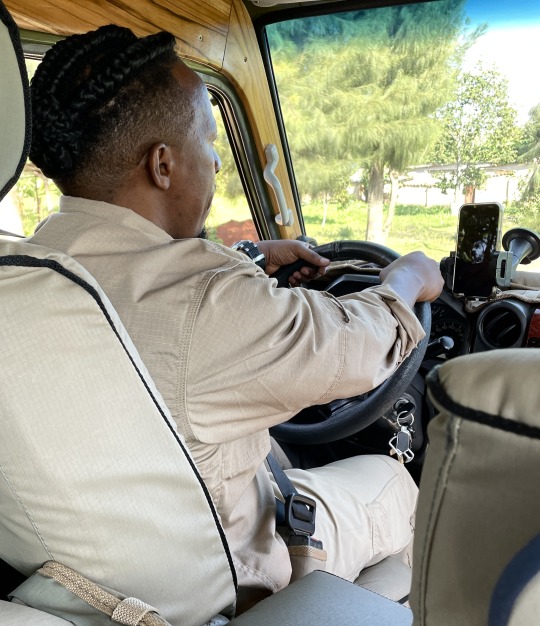
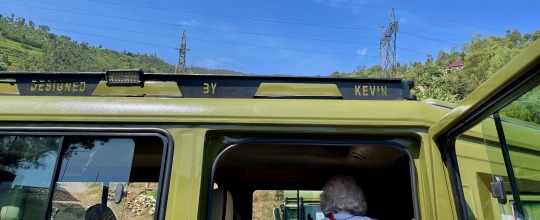
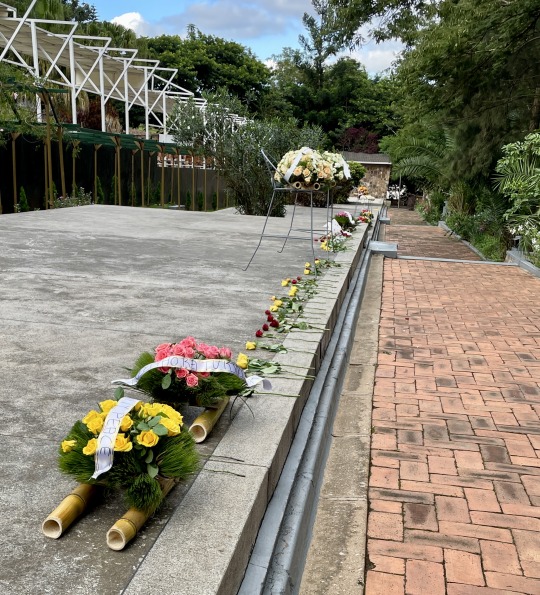
Our jeep driver Kevin told us we can share his story. During the slaughter of the Tutsi tribe by Hutu extremists, five members of Kevin's family were killed by a man they all knew. He almost killed Kevin too. Since then, Kevin has forgiven that man. With the help of a Tutsi leader who stopped the genocide and became president, Rwanda now has pride of place and respect for all, if you can imagine that. Outside of the Kigali Genocide Memorial are collective graves where 250,000 people are buried. Most of them are identified by plaques near the graves. Families and friends leave flowers in remembrance.
0 notes
Video
youtube
What caused the Rwandan Genocide? - Susanne Buckley-Zistel
#youtube#rwanda#africa#genocide#hutu#tutsi#war#occupation#apartheid#white supremisist#colonialism#embargo#accountability#united states#european union#united nations#class war#rebels#international#international relations#complex
0 notes
Text
Genocide Survivors to UK Govt: "Stop Exploiting Our Tragedy to Justify Rwanda Asylum Deal"
In a forceful open letter sent to UK Secretary of State James Cleverly today, the IGICUMBI association, one of the organizations representing survivors of the 1994 Genocide against the Tutsi in Rwanda, has accused the UK government of exploiting their tragedy to justify its controversial asylum seeker agreement with Rwanda. The strongly-worded letter comes as a response to Cleverly’s recent…

View On WordPress
#Africa#asylum#Igicumbi-Voix des rescapes du genocide contre les Tutsis#James Cleverly#news#politics#Rwanda#UK-Rwanda deal
0 notes
Text
1994 Rwandan Genocide
1994 Rwandan Genocide was caused by multiple factors, which include the rise of its population, lack of food supply, lack of prospects for men
The Rwanda genocide, which took place in 1994, was caused by multiple factors, which include the rise of its population, lack of food supply, lack of prospects for men aged in their 20s and the lack of land available for young men to start families. This led to this genocide for multiple reasons, not just the ethnic tensions between the Hutus, who made up 85% of the population, and the minority…

View On WordPress
0 notes
Text
The director of the New York Office of the High Commissioner for Human Rights of the UN (UN OHCHR), Craig Mokhiber, has resigned in a letter dated 28 October 2023
the resignation letter can be found embedded in this tweet by Rami Atari (@.Raminho) dated 31 October 2023.
The letters are here:
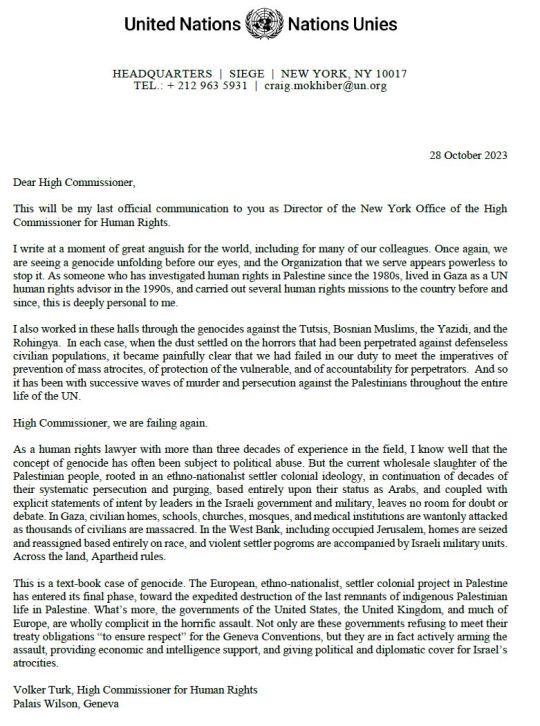
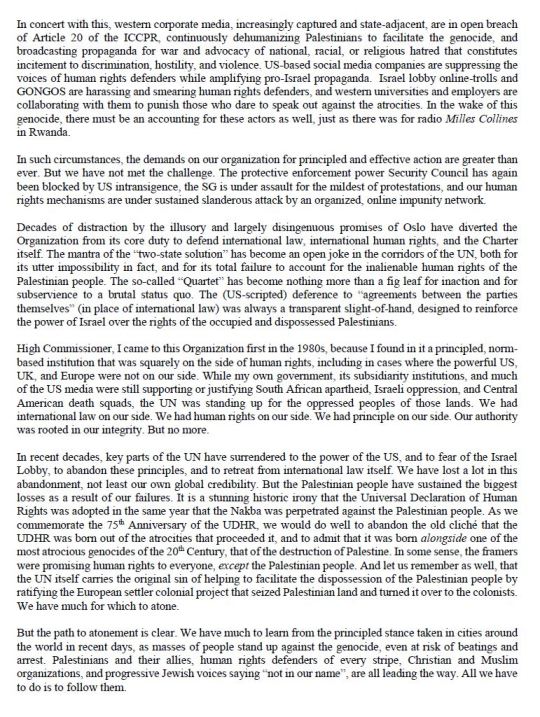
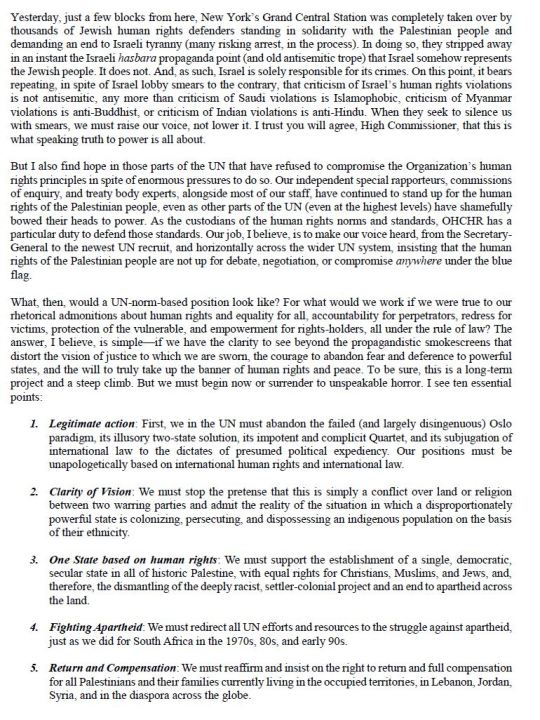
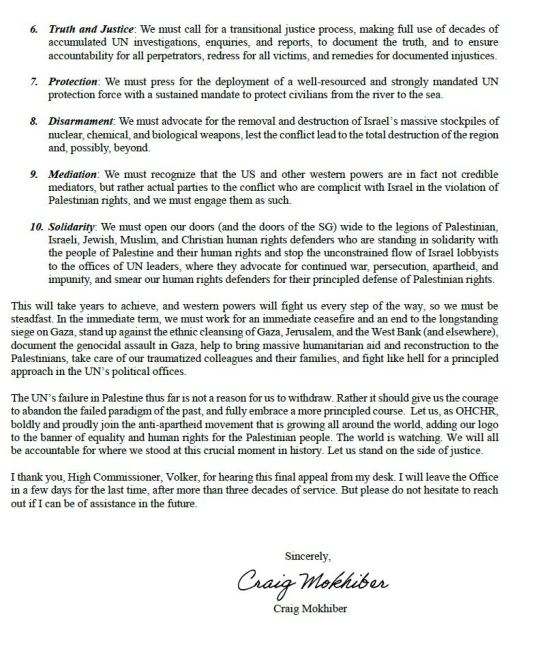
Transcription:
United Nations | Nations Unies
HEADQUARTERS I SIEGE I NEW YORK, NY 10017
28 October 2023
Dear High Commissioner,
This will be my last official communication to you as Director of the New York Office of the High Commissioner for Human Rights.
I write at a moment of great anguish for the world, including for many of our colleagues. Once again, we are seeing a genocide unfolding before our eyes, and the Organization that we serve appears powerless to stop it. As someone who has investigated human rights in Palestine since the 1980s, lived in Gaza as a UN human rights advisor in the 1990s, and carried out several human rights missions to the country before and since, this is deeply personal to me.
I also worked in these halls through the genocides against the Tutsis, Bosnian Muslims, the Yazidi, and the Rohingya. In each case, when the dust settled on the horrors that had been perpetrated against defenseless civilian populations, it became painfully clear that we had failed in our duty to meet the imperatives of prevention of mass atrocites, of protection of the vulnerable, and of accountability for perpetrators. And so it has been with successive waves of murder and persecution against the Palestinians throughout the entire life of the UN.
High Commissioner, we are failing again.
As a human rights lawyer with more than three decades of experience in the field, I know well that the concept of genocide has often been subject to political abuse. But the current wholesale slaughter of the Palestinian people, rooted in an ethno-nationalist settler colonial ideology, in continuation of decades of their systematic persecution and purging, based entirely upon their status as Arabs, and coupled with explicit statements of intent by leaders in the Israeli government and military, leaves no room for doubt or debate. In Gaza, civilian homes, schools, churches, mosques, and medical institutions are wantonly attacked as thousands of civilians are massacred. In the West Bank, including occupied Jerusalem, homes are seized and reassigned based entirely on race, and violent settler pogroms are accompanied by Israeli military units. Across the land, Apartheid rules.
This is a text-book case of genocide. The European, ethno-nationalist, settler colonial project in Palestine has entered its final phase, toward the expedited destruction of the last remnants of indigenous Palestinian life in Palestine. What's more, the governments of the United States, the United Kingdom, and much of Europe, are wholly complicit in the horrific assault. Not only are these governments refusing to meet their treaty obligations "to ensure respect" for the Geneva Conventions, but they are in fact actively arming the assault, providing economic and intelligence support, and giving political and diplomatic cover for Israel's atrocities.
Volker Turk, High Commissioner for Human Rights Palais Wilson, Geneva
In concert with this, western corporate media, increasingly captured and state-adjacent, are in open breach of Article 20 of the ICCPR, continuously dehumanizing Palestinians to facilitate the genocide, and broadcasting propaganda for war and advocacy of national, racial, or religious hatred that constitutes incitement to discrimination, hostility, and violence. US-based social media companies are suppressing the voices of human rights defenders while amplifying pro-Israel propaganda. Israel lobby online-trolls and GONGOS are harassing and smearing human rights defenders, and western universities and employers are collaborating with them to punish those who dare to speak out against the atrocities. In the wake of this genocide, there must be an accounting for these actors as well, just as there was for radio Mules Collins in Rwanda.
In such circumstances, the demands on our organization for principled and effective action are greater than ever. But we phave not met the challenge. The protective enforcement power Security Council has again been blocked by US intransigence, the SG [UN Secretary General] is under assault for the mildest of protestations, and our human rights mechanisms are under sustained slanderous attack by an organized, online impunity network.
Decades of distraction by the illusory and largely disingenuous promises of Oslo have diverted the Organization from its core duty to defend international law, international human rights, and the Charter itself. The mantra of the "two-state solution" has become an open joke in the corridors of the UN, both for its utter impossibility in fact, and for its total failure to account for the inalienable human rights of the Palestinian people. The so-called "Quartet" has become nothing more than a fig leaf for inaction and for subservience to a brutal status quo. The (US-scripted) deference to "agreements between the parties themselves" (in place of international law) was always a transparent slight-of-hand, designed to reinforce the power of Israel over the rights of the occupied and dispossessed Palestinians.
High Commissioner, I came to this Organization first in the 1980s, because I found in it a principled, norm-based institution that was squarely on the side of human rights, including in cases where the powerful US, UK, and Europe were not on our side. While my own government, its subsidiarity institutions, and much of the US media were still supporting or justifying South African apartheid, Israeli oppression, and Central American death squads, the UN was standing up for the oppressed peoples of those lands. We had international law on our side. We had human rights on our side. We had principle on our side. Our authority was rooted in our integrity. But no more.
In recent decades, key parts of the UN have surrendered to the power of the US, and to fear of the Israel Lobby, to abandon these principles, and to retreat from international law itself. We have lost a lot in this abandonment, not least our own global credibility. But the Palestinian people have sustained the biggest losses as a result of our failures. It is a stunning historic irony that the Universal Declaration of Human Rights was adopted in the same year that the Nakba was perpetrated against the Palestinian people. As we commemorate the 75th Anniversary of the UDHR, we would do well to abandon the old cliché that the UDHR was born out of the atrocities that proceeded it, and to admit that it was born alongside one of the most atrocious genocides of the 20th Century, that of the destruction of Palestine. In some sense, the framers were promising human rights to everyone, except the Palestinian people. And let us remember as well, that the UN itself carries the original sin of helping to facilitate the dispossession of the Palestinian people by ratifying the European settler colonial project that seized Palestinian land and turned it over to the colonists. We have much for which to atone.
But the path to atonement is clear. We have much to learn from the principled stance taken in cities around the world in recent days, as masses of people stand up against the genocide, even at risk of beatings and arrest. Palestinians and their allies, human rights defenders of every stripe, Christian and Muslim organizations, and progressive Jewish voices saying "not in our name", are all leading the way. All we have to do is to follow them.
Yesterday, just a few blocks from here, New York's Grand Central Station was completely taken over by thousands of Jewish human rights defenders standing in solidarity with the Palestinian people and demanding an end to Israeli tyranny (many risking arrest, in the process). In doing so, they stripped away in an instant the Israeli hasbara propaganda point (and old antisemitic trope) that Israel somehow represents the Jewish people. It does not. And, as such, Israel is solely responsible for its crimes. On this point, it bears repeating, in spite of Israel lobby smears to the contrary, that criticism of Israel's human rights violations is not antisemitic, any more than criticism of Saudi violations is Islamophobic, criticism of Myanmar violations is anti-Buddhist, or criticism of Indian violations is anti-Hindu. When they seek to silence us with smears, we must raise our voice, not lower it. I trust you will agree, High Commissioner, that this is what speaking truth to power is all about.
But I also find hope in those parts of the UN that have refused to compromise the Organization's human rights principles in spite of enormous pressures to do so. Our independent special rapporteurs, commissions of enquiry, and treaty body experts, alongside most of our staff, have continued to stand up for the human rights of the Palestinian people, even as other parts of the UN (even at the highest levels) have shamefully bowed their heads to power. As the custodians of the human rights norms and standards, OHCHR. has a particular duty to defend those standards. Our job, I believe, is to make our voice heard, from the Secretary-General to the newest UN recruit, and horizontally across the wider UN system, incisting that the human rights of the Palestinian people are not up for debate, negotiation, or compromise anywhere under the blue flag.
What, then, would a UN-norm-based position look like? For what would we work if we were true to our rhetorical admonitions about human rights and equality for all, accountability for perpetrators, redress for victims, protection of the vulnerable, and empowerment for rights-holders, all under the rule of law? The answer, I believe, is simple—if we have the clarity to see beyond the propagandistic smokescreens that distort the vision of justice to which we are sworn, the courage to abandon fear and deference to powerful states, and the will to truly take up the banner of human rights and peace. To be sure, this is a long-term project and a steep climb. But we must begin now or surrender to unspeakable horror. I see ten essential points:
Legitimate action: First, we in the UN must abandon the failed (and largely disingenuous) Oslo paradigm, its illusory two-state solution, its impotent and complicit Quartet, and its subjugation of international law to the dictates of presumed political expediency. Our positions must be unapologetically based on international human rights and international law.
Clarity of Vision: We must stop the pretense that this is simply a conflict over land or religion between two warring parties and admit the reality of the situation in which a disproportionately powerful state is colonizing, persecuting, and dispossessing an indigenous population on the basis of their ethnicity.
One State based on human rights: We must support the establishment of a single, democratic, secular state in all of historic Palestine, with equal rights for Christians, Muslims, and Jews, and, therefore, the dicmantling of the deeply racist, settler-colonial project and an end to apartheid across the land.
Fighting Apartheid: We must redirect all UN efforts and resources to the struggle against apartheid, just as we did for South Africa in the 1970s, 80s, and early 90s.
Return and Compensation: We must reaffirm and insist on the right to return and full compensation for all Palestinians and their families currently living in the occupied territories, in Lebanon, Jordan, Syria, and in the diaspora across the globe.
Truth and Justice: We must call for a transitional justice process, making full use of decades of accumulated UN investigations, enquiries, and reports, to document the truth, and to ensure accountability for all perpetrators, redress for all victims, and remedies for documented injustices.
Protection: We must press for the deployment of a well-resourced and strongly mandated UN protection force with a sustained mandate to protect civilians from the river to the sea.
Disarmament: We must advocate for the removal and destruction of Israel's massive stockpiles of nuclear, chemical, and biological weapons, lest the conflict lead to the total destruction of the region and, possibly, beyond.
Mediation: We must recognize that the US and other western powers are in fact not credible mediators, but rather actual parties to the conflict who are complicit with Israel in the violation of Palestinian rights, and we must engage them as such.
Solidarity: We must open our doors (and the doors of the SG) wide to the legions of Palestinian, Israeli, Jewish, Muslim, and Christian human rights defenders who are standing in solidarity with the people of Palestine and their human rights and stop the unconstrained flow of Israel lobbyists to the offices of UN leaders, where they advocate for continued war, persecution, apartheid, and impunity, and smear our human rights defenders for their principled defense of Palestinian rights.
This will take years to achieve, and western powers will fight us every step of the way, so we must be steadfast. In the immediate term, we must work for an immediate ceasefire and an end to the longstanding siege on Gaza, stand up against the ethnic cleansing of Gaza, Jerusalem, and the West Bank (and elsewhere), document the genocidal assault in Gaza, help to bring massive humanitarian aid and reconstruction to the Palestinians, take care of our traumatized colleagues and their families, and fight like hell for a principled approach in the UN's political offices.
The UN's failure in Palestine thus far is not a reason for us to withdraw. Rather it should give us the courage to abandon the failed paradigm of the past, and fully embrace a more principled course. Let us, as OHCHR, boldly and proudly join the anti-apartheid movement that is growing all around the world, adding our logo to the banner of equality and human rights for the Palestinian people. The world is watching. We will all be accountable for where we stood at this crucial moment in history. Let us stand on the side of justice.
I thank you, High Commissioner, Volker, for hearing this final appeal from my desk. I will leave the Office in a few days for the last time, after more than three decades of service. But please do not hesitate to reach out if I can be of assistance in the future.
Sincerely,
Craig Mokhiber
End of transcription.
Emphasis (bolding) is my own. I have added links, where relevant, to explanations of concepts the former Director refers to.
#Israel#Palestine#October 2023#28 October 2023#United Nations#Described#Long post#I’ll add more links to the things he is talking about later
15K notes
·
View notes
Text
Hague court releases Rwanda genocide suspect due to dementia
For decades, Felicien Kabuga was one of the most sought-after fugitives accused of genocide, the most serious crime under international law. As a result of his extensive wealth and use of 28 aliases, he managed to evade capture by authorities for decades while facing the prospect of a trial for his role in funding Free Radio and Television of the Thousand Hills or RTLM, a radio station directly…

View On WordPress
0 notes
Text
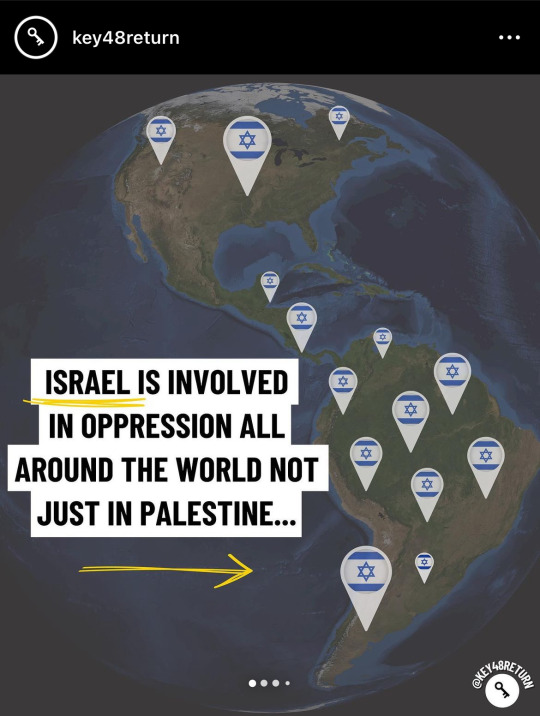
ID 1: Screenshot of a post by @/key48return on Instagram. Background is of a globe with pinpoints of the israeli flag all over North and South America. Title reads in all caps, “israel is involved in oppression all over the world not just in Palestine…” A yellow arrow points right underneath the title. End ID
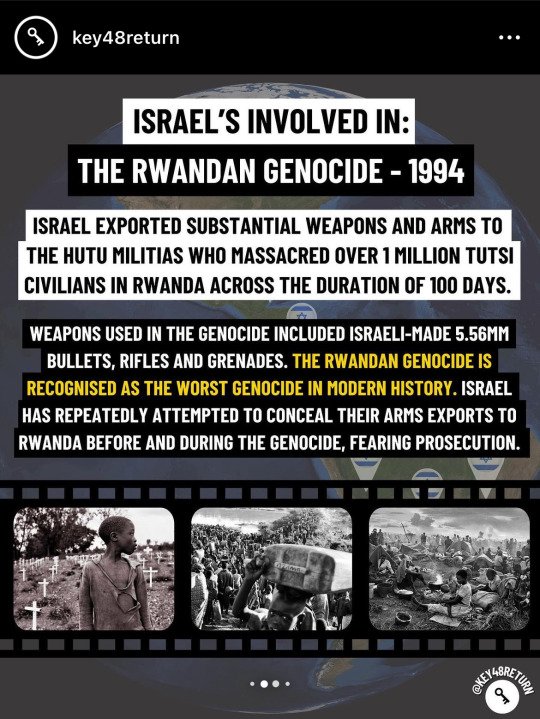
ID 2: In all caps, “ISRAEL'S INVOLVED IN:
THE RWANDAN GENOCIDE - 1994
ISRAEL EXPORTED SUBSTANTIAL WEAPONS AND ARMS TO THE HUTU MILITIAS WHO MASSACRED OVER 1 MILLION TUTSI CIVILIANS IN RWANDA ACROSS THE DURATION OF 100 DAYS.
WEAPONS USED IN THE GENOCIDE INCLUDED ISRAELI-MADE 5.56MM BULLETS, RIFLES AND GRENADES. THE RWANDAN GENOCIDE IS RECOGNISED AS THE WORST GENOCIDE IN MODERN HISTORY. ISRAEL HAS REPEATEDLY ATTEMPTED TO CONCEAL THEIR ARMS EXPORTS TO RWANDA BEFORE AND DURING THE GENOCIDE, FEARING PROSECUTION.”
Black and white photos below are shown of various Rwandan children in graveyards or in makeshift tents just trying to get by. End ID.
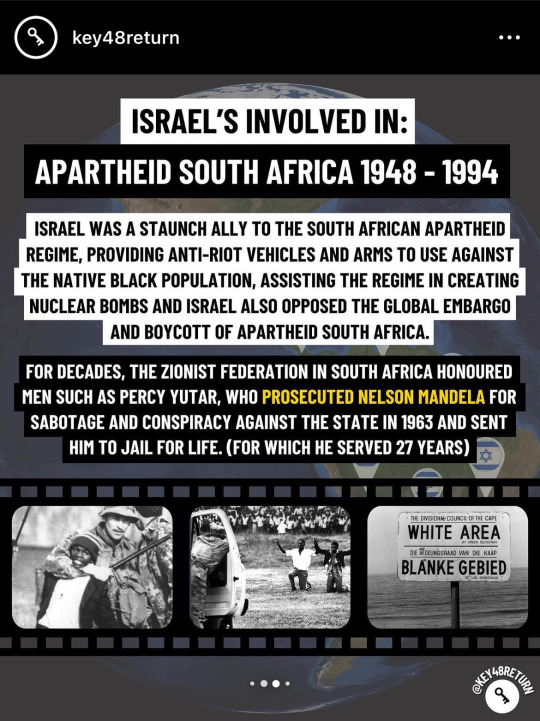
ID 3: In all caps, “ISRAEL'S INVOLVED IN:
APARTHEID SOUTH AFRICA 1948 - 1994
ISRAEL WAS A STAUNCH ALLY TO THE SOUTH AFRICAN APARTHEID REGIME, PROVIDING ANTI-RIOT VEHICLES AND ARMS TO USE AGAINST THE NATIVE BLACK POPULATION, ASSISTING THE REGIME IN CREATING NUCLEAR BOMBS AND ISRAEL ALSO OPPOSED THE GLOBAL EMBARGO AND BOYCOTT OF APARTHEID SOUTH AFRICA.
FOR DECADES, THE ZIONIST FEDERATION IN SOUTH AFRICA HONOURED MEN SUCH AS PERCY YUTAR, WHO PROSECUTED NELSON MANDELA FOR SABOTAGE AND CONSPIRACY AGAINST THE STATE IN 1963 AND SENT HIM TO JAIL FOR LIFE. (FOR WHICH HE SERVED 27 YEARS)”
Black and white photos below showcase a Black man being held in a chokehold by a white man, two Black people on their knees and hands up trying not to get shot, and a sign that reads in english and afrikaans “white area.” End ID.
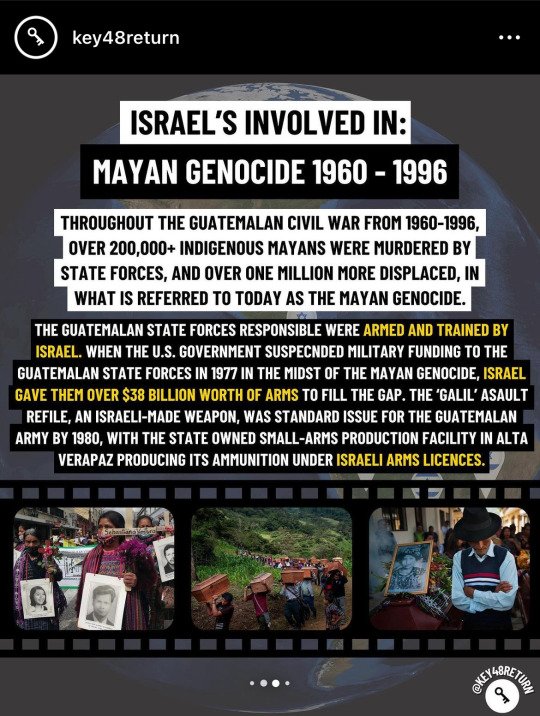
ID 4: In all caps, “ISRAEL'S INVOLVED IN:
MAYAN GENOCIDE 1960 - 1996
THROUGHOUT THE GUATEMALAN CIVIL WAR FROM 1960-1996, OVER 200,000+ INDIGENOUS MAYANS WERE MURDERED BY STATE FORCES, AND OVER ONE MILLION MORE DISPLACED, IN WHAT IS REFERRED TO TODAY AS THE MAYAN GENOCIDE.
THE GUATEMALAN STATE FORCES RESPONSIBLE WERE ARMED AND TRAINED BY ISRAEL. WHEN THE U.S. GOVERNMENT SUSPENDED MILITARY FUNDING TO THE GUATEMALAN STATE FORCES IN 1977 IN THE MIDST OF THE MAYAN GENOCIDE, ISRAEL GAVE THEM OVER $38 BILLION WORTH OF ARMS TO FILL THE GAP. THE 'GALIL' ASAULT RIFLE, AN ISRAELI-MADE WEAPON, WAS STANDARD ISSUE FOR THE GUATEMALAN ARMY BY 1980, WITH THE STATE OWNED SMALL-ARMS PRODUCTION FACILITY IN ALTA VERAPAZ PRODUCING ITS AMMUNITION UNDER ISRAELI ARMS LICENCES.”
Below are multiple in-color photos of Mayan families mourning, one photo in particular which shows indigenous Mayans carrying a seemingly endless line of coffins off into the distance. End ID.
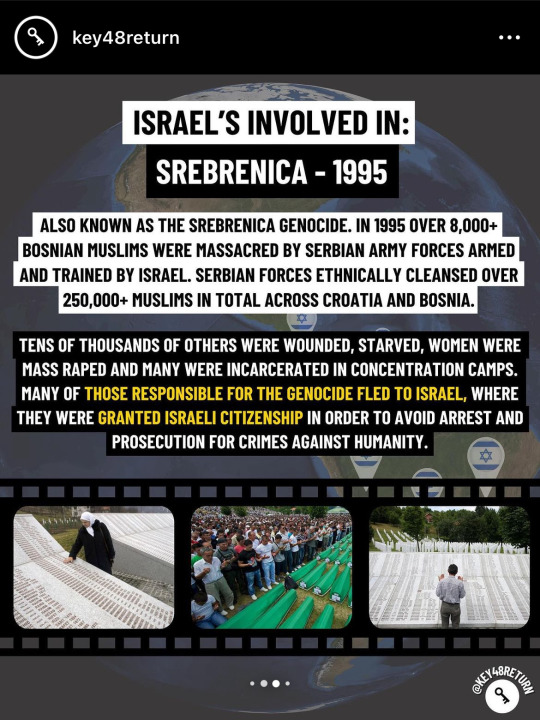
ID 5: In all caps, “ISRAEL'S INVOLVED IN:
SREBRENICA - 1995
ALSO KNOWN AS THE SREBRENICA GENOCIDE. IN 1995 OVER 8,000+ BOSNIAN MUSLIMS WERE MASSACRED BY SERBIAN ARMY FORCES ARMED AND TRAINED BY ISRAEL. SERBIAN FORCES ETHNICALLY CLEANSED OVER 250,000+ MUSLIMS IN TOTAL ACROSS CROATIA AND BOSNIA.
TENS OF THOUSANDS OF OTHERS WERE WOUNDED, STARVED, WOMEN WERE MASS RAPED AND MANY WERE INCARCERATED IN CONCENTRATION CAMPS. MANY OF THOSE RESPONSIBLE FOR THE GENOCIDE FLED TO ISRAEL, WHERE THEY WERE GRANTED ISRAELI CITIZENSHIP IN ORDER TO AVOID ARREST AND PROSECUTION FOR CRIMES AGAINST HUMANITY.”
Once again, the in-color photos below show various peoples mourning. Two of the photos specifically show people reaching their hands out over extremely long lists of just names of people who have died. End ID.

ID 6: In all caps, “ISRAEL'S INVOLVED IN:
TRAINING U.S. POLICE
SINCE 1990, HUNDREDS OF AMERICAN POLICE OFFICERS, INCLUDING AGENTS FROM THE FBI, CIA AND IMMIGRATION AND CUSTOMS ENFORCEMENT (ICE), HAVE EITHER BEEN SENT TO ISRAEL THROUGH POLICE TRAINING EXCHANGES, OR ATTENDED SUMMITS WITHIN THE U.S. THAT WERE SPONSORED BY ISRAELI LOBBY ORGANISATIONS.
THE KNEE-TO-NECK 'RESTRAINT' THAT DEREK CHAUVIN MURDERED GEORGE FLOYD WITH, IS OFTEN USED BY ISRAELI POLICE AND SOLIDERS AGAINST PALESTINIANS.
BLACK LIVES MATTER.”
Photos below are in-color and show various B.L.M. protests. End ID.
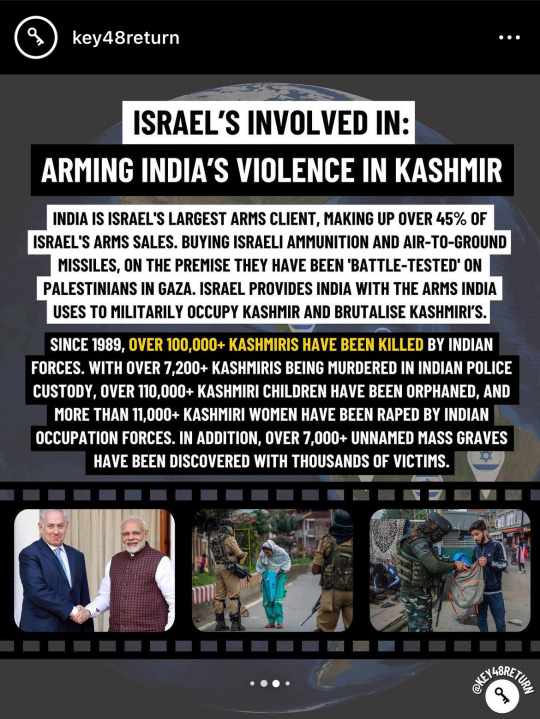
ID 7: In all caps, “ISRAEL'S INVOLVED IN:
ARMING INDIA'S VIOLENCE IN KASHMIR
INDIA IS ISRAEL'S LARGEST ARMS CLIENT, MAKING UP OVER 45% OF ISRAEL'S ARMS SALES. BUYING ISRAELI AMMUNITION AND AIR-TO-GROUND MISSILES, ON THE PREMISE THEY HAVE BEEN 'BATTLE-TESTED' ON PALESTINIANS IN GAZA. ISRAEL PROVIDES INDIA WITH THE ARMS INDIA USES TO MILITARILY OCCUPY KASHMIR AND BRUTALISE KASHMIRI'S.
SINCE 1989, OVER 100,000+ KASHMIRIS HAVE BEEN KILLED BY INDIAN FORCES. WITH OVER 7,200+ KASHMIRIS BEING MURDERED IN INDIAN POLICE CUSTODY, OVER 110,000+ KASHMIRI CHILDREN HAVE BEEN ORPHANED, AND MORE THAN 11,000+ KASHMIRI WOMEN HAVE BEEN RAPED BY INDIAN OCCUPATION FORCES. IN ADDITION, OVER 7,000+ UNNAMED MASS GRAVES HAVE BEEN DISCOVERED WITH THOUSANDS OF VICTIMS.”
The photos below show israel and india’s leaders shaking hands and various armed indian soldiers stopping Kashmiris for unnecessary checks. End ID.
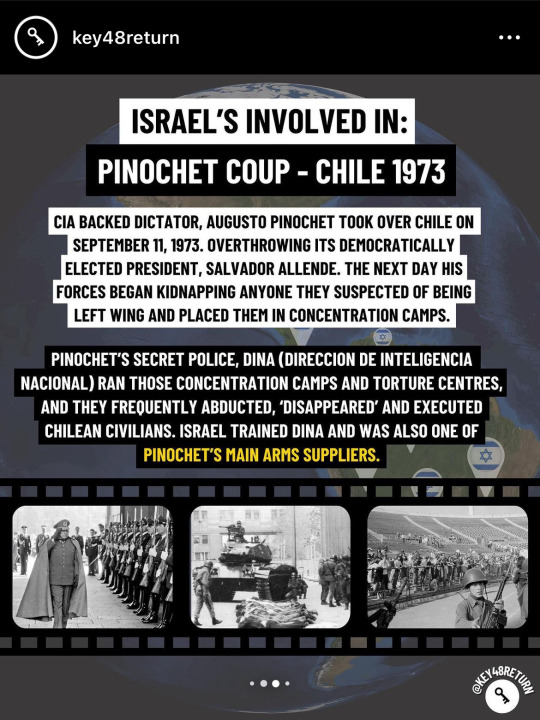
ID 8: In all caps, “ISRAEL'S INVOLVED IN:
PINOCHET COUP - CHILE 1973
CIA BACKED DICTATOR, AUGUSTO PINOCHET TOOK OVER CHILE ON SEPTEMBER 11, 1973. OVERTHROWING ITS DEMOCRATICALLY ELECTED PRESIDENT, SALVADOR ALLENDE. THE NEXT DAY HIS FORCES BEGAN KIDNAPPING ANYONE THEY SUSPECTED OF BEING LEFT WING AND PLACED THEM IN CONCENTRATION CAMPS.
PINOCHET'S SECRET POLICE, DINA (DIRECCION DE INTELIGENCIA NACIONAL) RAN THOSE CONCENTRATION CAMPS AND TORTURE CENTRES, AND THEY FREQUENTLY ABDUCTED, 'DISAPPEARED' AND EXECUTED CHILEAN CIVILIANS. ISRAEL TRAINED DINA AND WAS ALSO ONE OF PINOCHET'S MAIN ARMS SUPPLIERS.”
Black and white photos below showcase various scenes of armed DINA officers, with one photo in particular showing them in a tank over bodies on the ground, presumably dead. End ID.
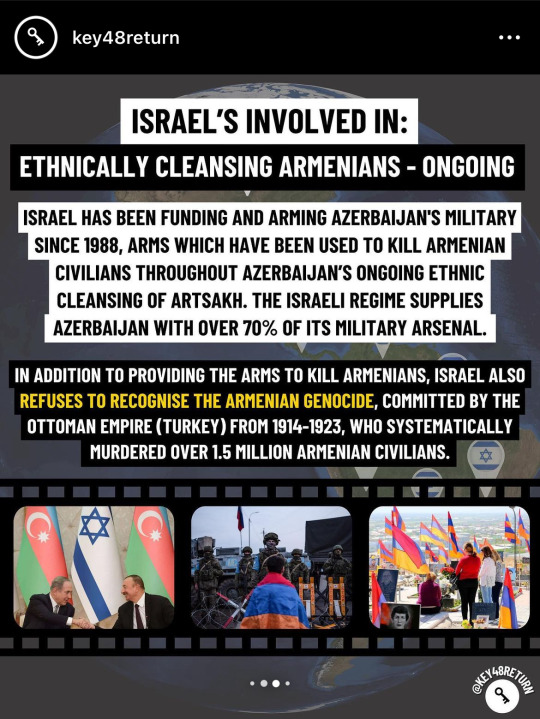
ID 9: In all caps, “ISRAEL'S INVOLVED IN:
ETHNICALLY CLEANSING ARMENIANS - ONGOING
ISRAEL HAS BEEN FUNDING AND ARMING AZERBAIJAN'S MILITARY SINCE 1988, ARMS WHICH HAVE BEEN USED TO KILL ARMENIAN CIVILIANS THROUGHOUT AZERBAIJAN'S ONGOING ETHNIC CLEANSING OF ARTSAKH. THE ISRAELI REGIME SUPPLIES AZERBAIJAN WITH OVER 70% OF ITS MILITARY ARSENAL.
IN ADDITION TO PROVIDING THE ARMS TO KILL ARMENIANS, ISRAEL ALSO REFUSES TO RECOGNISE THE ARMENIAN GENOCIDE, COMMITTED BY THE OTTOMAN EMPIRE (TURKEY) FROM 1914-1923, WHO SYSTEMATICALLY MURDERED OVER 1.5 MILLION ARMENIAN CIVILIANS.”
Photos below show israel and azerbaijan’s leaders shaking hands, azerbaijan’s soldiers menacingly standing in front of someone wrapped in an Armenian flag, and Armenians mourning over a shrine with their flags all around them. End ID.

ID 10: In all caps, “THE PALESTINIAN STRUGGLE FOR FREEDOM IS CONNECTED TO STRUGGLES ALL AROUND THE WORLD.
BECAUSE OPPRESSORS LIKE ISRAEL ARE NOT ONLY UPHOLDING OPPRESSION AGAINST ONE POPULATION, ITS ALWAYS INTERCONNECTED TO OPPRESSING MANY MORE.
FREE PALESTINE.” No photos at the bottom of this slide. End ID.
#reaux speaks#oppression#genocide#ethnic cleansing#apartheid#israel#palestine#free palestine#black lives matter#history#rwanda#africa#south africa#nelson mandela#mayans#guatemala#srebrenica#muslim#police brutality#kashmir#india#narendra modi#benjamin netanyahu#augusto pinochet#chile#armenia#artsakh#azerbaijan#bosnia#serbia
3K notes
·
View notes
Text
Something that honestly scares me is this maniacle belief that no one is allowed to have any joy or enjoy anything because bad things are happening in Gaza. Like people will disrupt anything fun or happy to make sure everyone is aware what's going on.
I've never seen suffering appropriation like this before. Not while Azerbaijan cleansed it's entire 400,000 person ethnic Armenian population, not while China enslaved and is still enslaving Uyghurs, not while there are genocides in Sudan, and Myanmar, and the ongoing hutu-tutsi fighting on the Rwanda/DRC boarder.
Literally every person knows what's happening in the middle east. It's been plastered on every screen for months. The idea that no one is allowed any joy because of that is baffling and counterproductive in so many ways
494 notes
·
View notes
Text
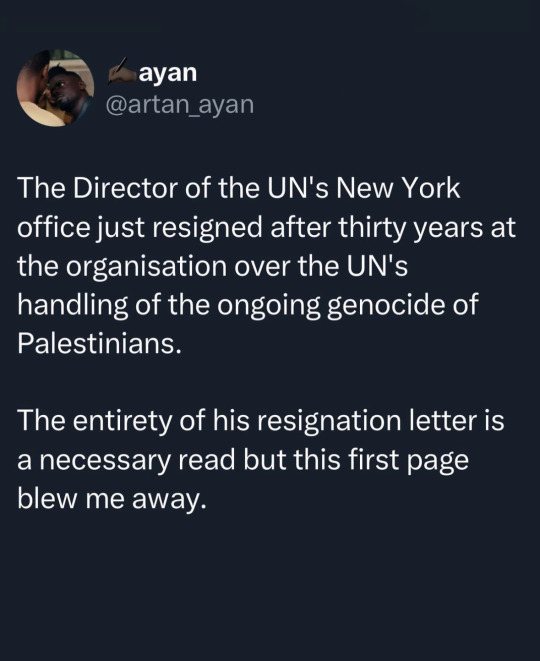
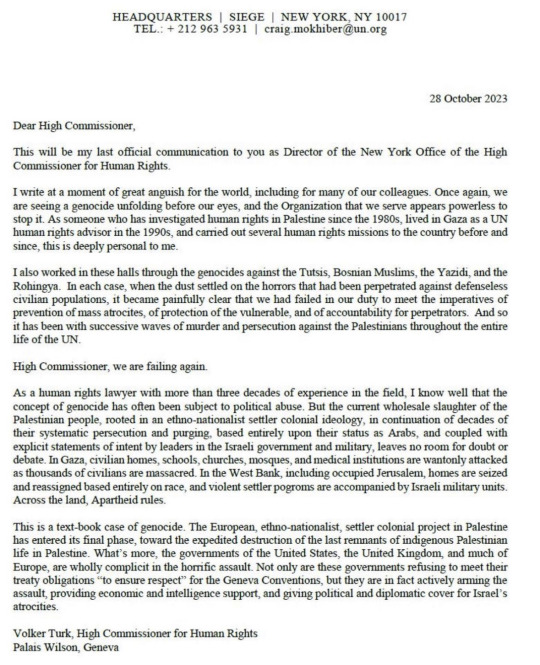
Dear High Commissioner,
This will be my last official communication to you as Director of the New York Office of the High Commissioner for Human Rights.
I write at a moment of great anguish for the world, including for many of our colleagues. Once again, we are seeing a genocide unfolding before our eyes, and the Organization that we serve appears powerless to stop it. As someone who has investigated human rights in Palestine since the 1980s, lived in Gaza as a UN human rights advisor in the 1990s, and carried out several human rights missions to the country before and since, this is deeply personal to me.
I also worked in these halls through the genocides against the Tutsis, Bosnian Muslims, the Yazidi, and the Rohingya. In each case, when the dust settled on the horrors that had been perpetrated against defenseless civilian populations, it became painfully clear that we had failed in our duty to meet the imperatives of prevention of mass atrocites, of protection of the vulnerable, and of accountability for perpetrators. And so it has been with successive waves of murder and persecution against the Palestinians throughout the entire life of the UN.
High Commissioner, we are failing again.
As a human rights lawyer with more than three decades of experience in the field, I know well that the concept of genocide has often been subject to political abuse. But the current wholesale slaughter of the Palestinian people, rooted in an ethno-nationalist settler colonial ideology, in continuation of decades of their systematic persecution and purging, based entirely upon their status as Arabs, and coupled with explicit statements of intent by leaders in the Israeli government and military, leaves no room for doubt or debate. In Gaza, civilian homes, schools, churches, mosques, and medical institutions are wantonly attacked as thousands of civilians are massacred. In the West Bank, including occupied Jerusalem, homes are seized and reassigned based entirely on race, and violent settler pogroms are accompanied by Israeli military units. Across the land, Apartheid rules.
This is a textbook case of genocide. The European, ethno-nationalist, settler colonial project in Palestine has entered its final phase, toward the expedited destruction of the last remnants of indigenous Palestinian life in Palestine. What's more, the governments of the United States, the United Kingdom, and much of Europe, are wholly complicit in the horrific assault. Not only are these governments refusing to meet their treaty obligations "to ensure respect" for the Geneva Conventions, but they are in fact actively arming the assault, providing economic and intelligence support, and giving political and diplomatic cover for Israel's atrocities.
Volker Turk, High Commissioner for Human Rights Palais Wilson, Geneva
Full letter
2K notes
·
View notes